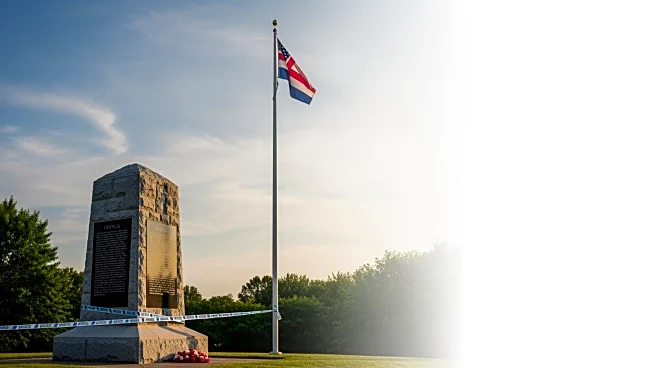Rapid Read • 8 min read
Archaeologists have unearthed a remarkably well-preserved Roman mausoleum in Saint-Romain-en-Gal, near Lyon, France. The structure, dating back to around 50 CE, is modeled after the Mausoleum of Augustus in Rome and measures over 50 feet in diameter with ceilings that once stood 20 feet tall. This discovery is significant as it is one of only 18 mound mausoleums found in France and the only known circular elevation monument in such pristine condition. The mausoleum is believed to have been constructed for a member of the aristocratic elite with strong ties to imperial authority, as suggested by its opulence and strategic location. Additionally, the site revealed the remains of three ancient shops from the 1st and 2nd centuries CE, which were preserved by a fire. These shops, part of a larger commercial complex, provide insights into local commerce and artisan activities of the time.
AD
The discovery of the Roman mausoleum and accompanying shops offers valuable insights into the socio-economic and political landscape of Roman Gaul. The mausoleum's resemblance to the Mausoleum of Augustus indicates the presence of influential political figures in the region, highlighting the connection between local and imperial authorities. The well-preserved state of the shops provides rare evidence of everyday economic activities, shedding light on local commerce and the thriving artisan class. This discovery enhances the understanding of local trade dynamics, complementing existing knowledge of long-distance trade during the Roman period. The findings contribute to a broader understanding of Roman influence in Gaul and the integration of local economies into the Roman Empire.
Excavations at the site are set to continue through 2027, in collaboration with universities in Aix-Marseille, Université de Franche-Comté, and the CNRS. These efforts aim to uncover more about the local commerce and social structures of the time. The ongoing research will likely provide further insights into the daily lives of the people in Roman Gaul and their interactions with the broader Roman Empire. The findings may also prompt additional archaeological investigations in the region, potentially leading to more discoveries that could reshape the understanding of Roman history in France.
AD
More Stories You Might Enjoy










